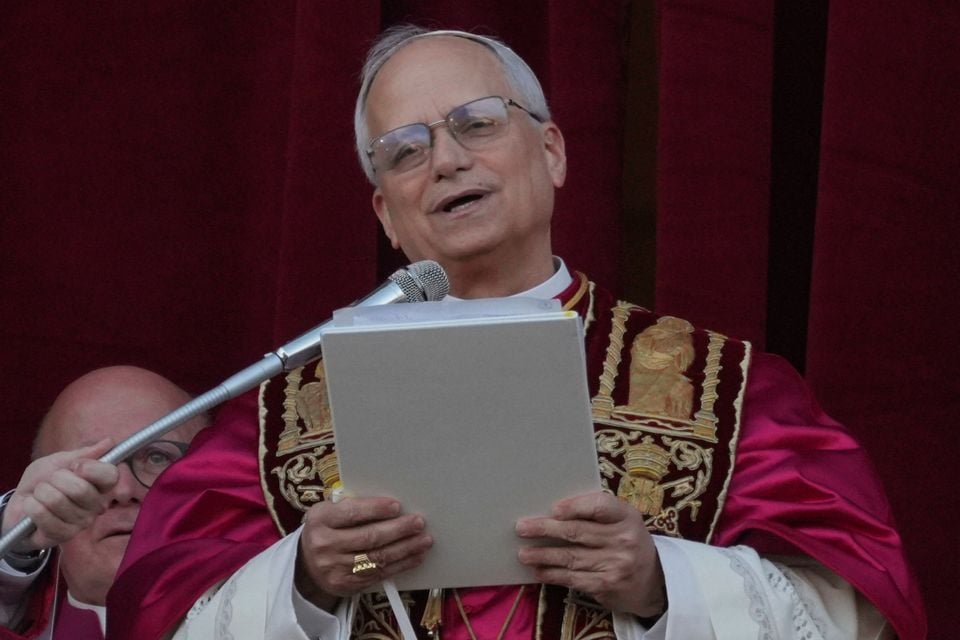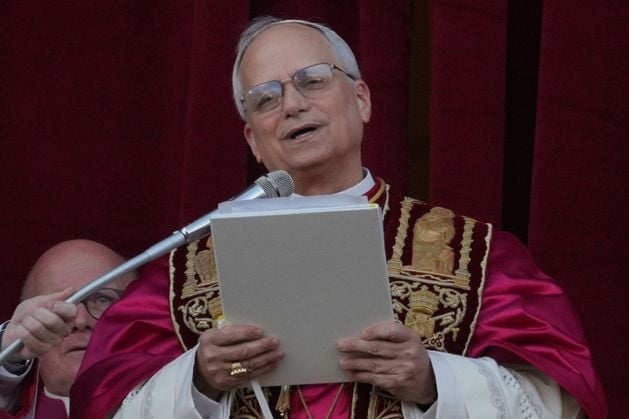Leo XIV emerged onto the balcony of St Peter’s Basilica as a packed St Peter’s Square erupted in cheers and applause.
He was Cardinal Robert Prevost, is from Chicago and is fairly young for a Pope, at the age of 69.
Northern Ireland’s political leaders are among those who have been sending messages of support to the new pontiff.
First Minister Michelle O’Neill hailed Thursday as “a day of profound significance for Catholics in Ireland and worldwide” as she urged the spiritual leader to “use his influence to stand up for the marginalised and oppressed, champion peace, and lead with courage and compassion – just as his predecessor, Pope Francis, did”.
SDLP leader Claire Hanna also appealed to Pope Leo to follow the example of his predecessor and “not shy away from calling out injustice and inhumanity” at a time “when the Church needs to reflect the needs of a changing world”.
“Pope Francis led with humility, grace and decency, qualities that earned him the admiration of people of every faith and none,” the MP said.
“I hope Pope Leo will continue in that spirit, offering leadership that is compassionate, courageous and grounded in service.”
Crowds had been joyously waving flags and chanting “Habemus Papam” – the Latin for “we have a Pope” – since white smoke rose from the Sistine Chapel shortly after 5pm UK time on Thursday.

Newly elected Pope Leone XIV appears at the balcony of St. Peter’s Basilica at the Vatican, Thursday, May 8, 2025. (AP Photo/Andrew Medichini)
Black smoke confirms no pope elected in first conclave voting round
The new pontiff is the 267th Pope, becoming the religious leader of some 1.4 billion Catholics across the globe and someone believed to be called as the successor to St Peter, who was the first.
The secret conclave meeting – steeped in tradition and mystery – had only just begun some 24 hours earlier.
The 133 cardinals had voted on Wednesday evening and Thursday morning, with black smoke emitted from the chapel chimney twice, showing no-one had been elected.
But in the bright sunshine of Thursday afternoon, white smoke began to billow out, with onlookers bearing witness to history as the Church confirmed it had its new leader.
Bells tolled to confirm the news – perhaps in a marker of the confusion at previous conclaves where the colour of the smoke was not completely clear.
Conclave: White smoke and dark secrets, Catholic cardinals are choosing the next pope
Each of the electors, mostly dressed in distinctive bright red vestments, had taken an oath pledging secrecy ahead of the process of casting anonymous ballots for their choice.
At a special mass ahead of the conclave, cardinals were reminded of the “choice of exceptional importance” they must make.
Three UK cardinals took part in conclave – Cardinal Vincent Nichols, Cardinal Timothy Radcliffe and Rome-based Cardinal Arthur Roche.
Cardinal Kevin Farrell, who also took part in the conclave, is Irish-born but has mainly ministered in the US and been based in Rome for some years.
The voting cardinals – those aged under 80 who were the only ones eligible to cast a ballot – were urged to “invoke the help of the Holy Spirit” to help them elect a pope “whom the Church and humanity need at this difficult and complex turning point in history”.
This conclave was thought to be one of the most diverse of any meeting of cardinals before, representing some 70 countries and hailing from places like Mongolia, Sweden and Tonga, which had not had a cardinal before.
Pope Francis had appointed some 108 of the 133 cardinals who took part in the conclave to choose his successor.
The new Pope will have the challenge of following in the footsteps of the late Francis, whose popularity saw him dubbed “the people’s pope”.
He had been vocal on politics, speaking out against war and climate change, and urged more focus on the poor and downtrodden of the world.
His death on Easter Monday prompted warm tributes from leaders across the globe and his funeral last month drew hundreds of thousands of mourners, including US president Donald Trump and UK Prime Minister Sir Keir Starmer.

